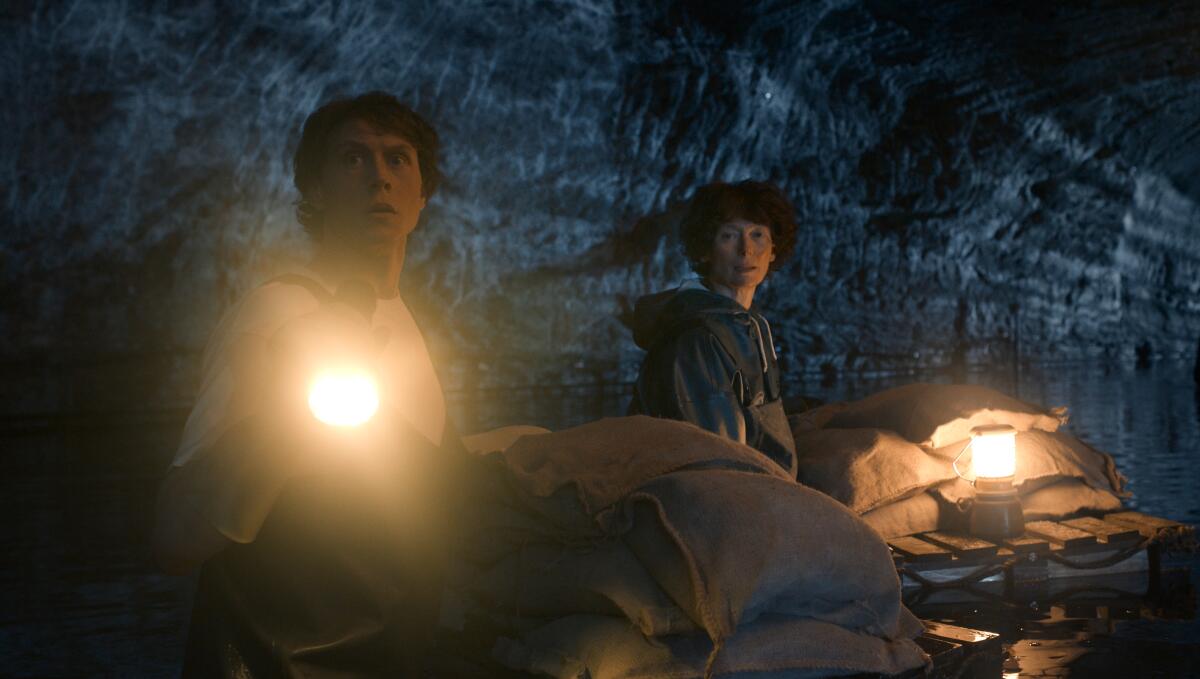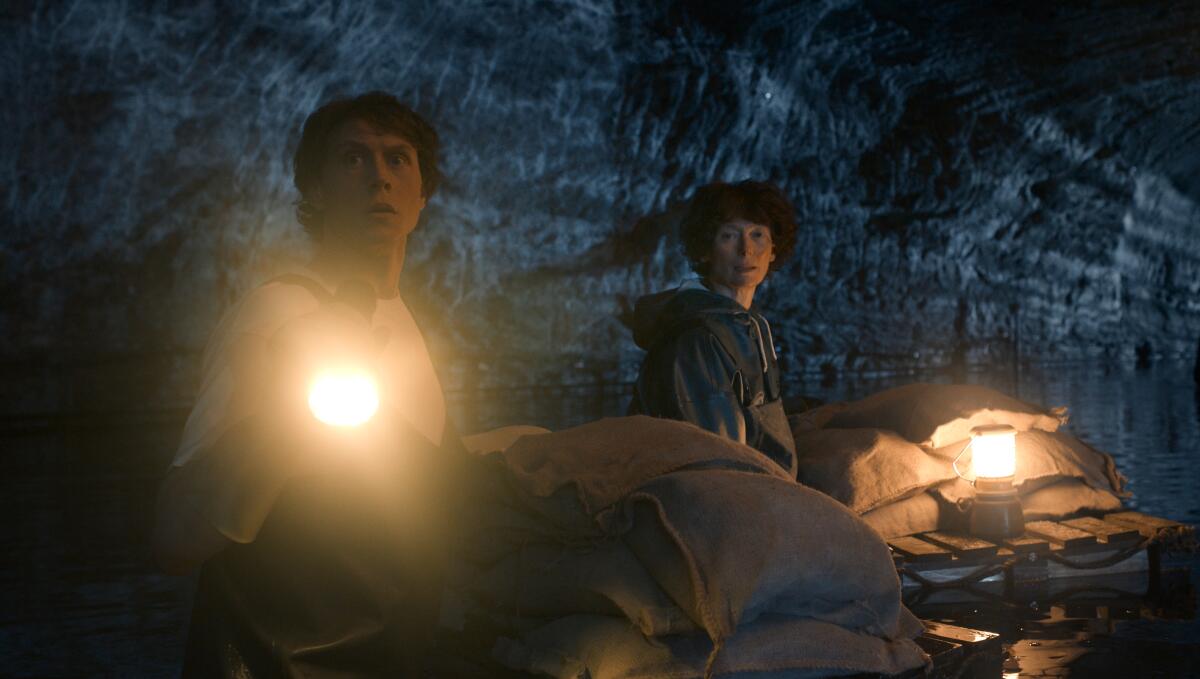“The End,” by director Joshua Oppenheimer (“The Act of Killing,” “The Look of Silence”), is a gloomy musical about perhaps the only six people left on Earth: an oilman and his trophy wife (Michael Shannon and Tilda Swinton), their bunker-born adult son (George MacKay) and the three aides (Bronagh Gallagher, Tim McInnerny, Lennie James) invited into this underground ark.
Something awful is outside. We hear allusions to a blood-red sun, a poisoned sea and buzzards. But this salt mine-slash-sanctuary boasts walls hung with fine art and a dinner table set for wine and Champagne. These survivors have walled-off suffering for more than 20 years. Still, they can’t breathe.
Not in the literal sense. The cast has the lung capacity for more than two hours of singing and the songs, which Oppenheimer wrote the lyrics for and composer Joshua Schmidt scored, are flat-out stunners, belted with humble charm. If a voice cracks, it cracks. The emotion holds center stage, backed by adamant violins and horns and sneaky melodies that vault up an octave to hit surprising notes.
But there’s not enough air in here for everyone to have a personality. The characters are all rigorously mannered, as though they’re mimicking the mannequins in old film strips of 1950s bomb shelters. In the opening song, people stroll into the living room one by one, casually clutching mugs of coffee, and when they realize the others are already crooning about another perfect new morning, they join in as though to be polite. “We fight through the dark together / our future is bright,” they harmonize, keeping their backs as straight as a church choir.
The irony is obvious and for the first hour, that’s all there is. The assured magnate, the superficial wife, the doted-upon child who was raised so cloistered he whistles canary songs to a tank of crawdads and tries to teach pet tricks to a fish. These aren’t full characters — they don’t even merit names — they’re just the clichés we’d expect to see dining on Dover sole while the rest of us are dead. (Plus the workers don’t merit much attention.) Oppenheimer and his co-screenwriter Rasmus Heisterberg have given each family member one flaw that they sing about so incessantly that the running time could be slashed by a third. We get it, bunker life is airless. This house is so gray and cold that something’s got to snap.
During the film’s stiff and dull first stretch, the family discovers a young stranger, played by Moses Ingram, who has endured the apocalypse long enough to track the source of their smoke exhaust. If you think that’s implausible, wait til you see how this presumably hardscrabble refugee — a girl who has never before worn shoes — not only arrives with TikTok-trained options about the rights of the working class, but appears unfazed by these opulent digs.

George MacKay and Tilda Swinton in the movie “The End.”
(Neon)
Ingram and MacKay start off like the kind of couple you wouldn’t put together even though they truly might be the last fertile singles alive. But they warm to each other enough to sing their own duet, running through the salt mine with their arms stretched wide. (The choreographers Sam Pinkleton and Ani Taj smartly choose liberated movement over precision.) Finally, the film kicks up its heels and becomes something beautiful.
Oppenheimer is after something that drives right at the heart of what a musical is. To harmonize means to agree. It’s a public display of solidarity — a pact to parrot the same delusions. Here, it’s only when these characters splinter off on their own that they sing their truth. Even then, they’ve been so suffocated by lies that they can’t always come up with the right words. In one number, Swinton, who goes glossy-eyed to show the cracks in her high-fashion veneer, poses in a transparent rain slicker while bleating raw, yowling noises that blend with the despairing strings. As for the naive son, whom MacKay plays with apple-cheeked precociousness plus a brain worm, during his wildest solo, he thrusts his crotch and goes, “Nyah, nyah!”
Lies are to Oppenheimer what the skeleton was to Da Vinci. He’s fixated on understanding how they work, how they evolve and bend, how they wind up controlling the way a person moves through life. When Shannon’s patriarch insists that “drilling for oil was just an excuse for wind farms, clean water, save the chimpanzees,” he’s rewriting history for an audience of no one but himself and how he wants his son to see him. The scale of destruction he has caused is vague and unspeakable. We know riots were involved because he insists they weren’t.
Given that our setting is the end of the world and all, we can estimate that his death toll trumps that of Oppenheimer’s breakthrough 2012 documentary, “The Act of Killing,” in which the former soldiers of an Indonesian death squad reenacted their past massacres to shore up their conviction that they were the heroes. That powerful film sided with our desire to punish the aggressors. But when Shannon’s fossil-fuel tycoon rebuts that the rest of humanity drove cars, too, well, he’s got a point.
Perhaps out of a shared sense of guilt, Oppenheimer yearns to give these sinners a chance to atone for their mistakes. Alone, they plead for forgiveness, like when Shannon scales a mound of salt clutching a taxidermy bird like he fancies himself the heroine of “The Sound of Music.” Rather than condemn its characters forever, “The End” gives these plastic people the choice to reclaim their humanity. That’s what turns out to be torture.
This is a musical that treasures goofy imperfection, a scene where McInnerny does a funny little tap dance, or the joy in Shannon’s hyena cackle. Oppenheimer untethers his script from the responsibilities of explaining how this doomsday manor functions. The food stash, the waste disposal, none of that comes into play, and the characters are wholly incurious about whatever’s going on outside their cave. Instead, all the attention goes to micro-shifts in people’s moods, which, for characters this manicured, are as dramatic as a new ripple in a rock garden.
Only Ingram’s home invader can be both happy and sad at once. The girl can’t wall her emotions away and that rattles this bunker to its very foundation. The film around her is itself built on a fault line of contradictions — it’s at once tepid and sledgehammer-insistent, a slab of decadent milquetoast. But you leave thinking about the question the characters never bring themselves to ask or sing: What’s the difference between being alive and living?
‘The End’
Not rated
Running time: 2 hours, 28 minutes
Playing: In limited release, opens Dec. 6
